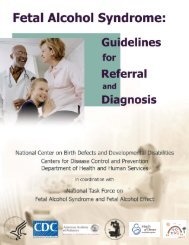FETAL ALCOHOL SPECTRUM DISORDERS florida resource guide
FETAL ALCOHOL SPECTRUM DISORDERS florida resource guide
FETAL ALCOHOL SPECTRUM DISORDERS florida resource guide
- No tags were found...
You also want an ePaper? Increase the reach of your titles
YUMPU automatically turns print PDFs into web optimized ePapers that Google loves.
SECTION 6PreventionFuture Strategies to Prevent FASDEducate the General PublicThousands ofinfantscontinue to be bornwith preventablebirth defects due toprenatal alcoholexposure .— Blume. S. 1996Public education is the cornerstone of all FAS prevention efforts(Streissguth, 1997). We must do a better job of communicating thatFAS is public health issue of considerable magnitude.▪ In a study of alcohol related issues in the national press (Lemmons,Vaeth, & Greenfeild, 1999), researchers found that of the 1,677articles reviewed, only 23 dealt with alcohol and pregnancy.▪ In a study of national network evening news broadcasts between1977 and 1996 revealed that alcohol and pregnancy was the topicof a newscast a mere 36 times.Educate Health Care ProfessionalsEarly detection and identification of women at risk for alcoholconsumption during pregnancy is a primary preventative strategy forreducing the incidence of FAS/FAE. However, only 20% of obstetriciangynecologistssurveyed in a recent study reported abstinence as the safestway to avoid FAS/FAE (Diekman, Floyd, DeCoufle, Schulkin,Ebrahim, & Sokol, 2000). Of even greater concern is the finding that13% were unsure about the risk of alcohol consumption associated withFAS/FAE. Moreover, physicians graduating from medical school before1973 were less likely than those graduating after 1989 to be sure of therisk of prenatal alcohol consumption and least likely to use a validscreening tool to identify women at risk.In 2002, seventy-five family physicians in the Toronto area respondedto a survey regarding the prevention and diagnosis of FAS. Only 60.8%reported counseling childbearing women in general on the use ofalcohol. Even more troubling is that 25% reported that they did notcounsel pregnant women on the use of alcohol (Nevin, Parshuram,Nulman, Koren, & Einarson, 2003).When asking why so many physicians are not screening and counselingwomen on the dangers of prenatal alcohol exposure, one might look ata recent study of 81 obstetrical textbooks identified from a nationallisting service and local library shelves. Of these 81 textbooks only 14(17%) contained a consistent recommendation that pregnant womenshould not drink alcohol. Further, of the 29 texts published after 1990,only 24% were in this category. Fifty-three percent of all 81 texts and52% of texts published after 1990 contained a sentence condoningdrinking at some level. The remaining texts (30%) contained norecommendations (Loop, & Nettelman, 2002).54 <strong>FETAL</strong> <strong>ALCOHOL</strong> <strong>SPECTRUM</strong> <strong>DISORDERS</strong> <strong>florida</strong> <strong>resource</strong> <strong>guide</strong>



